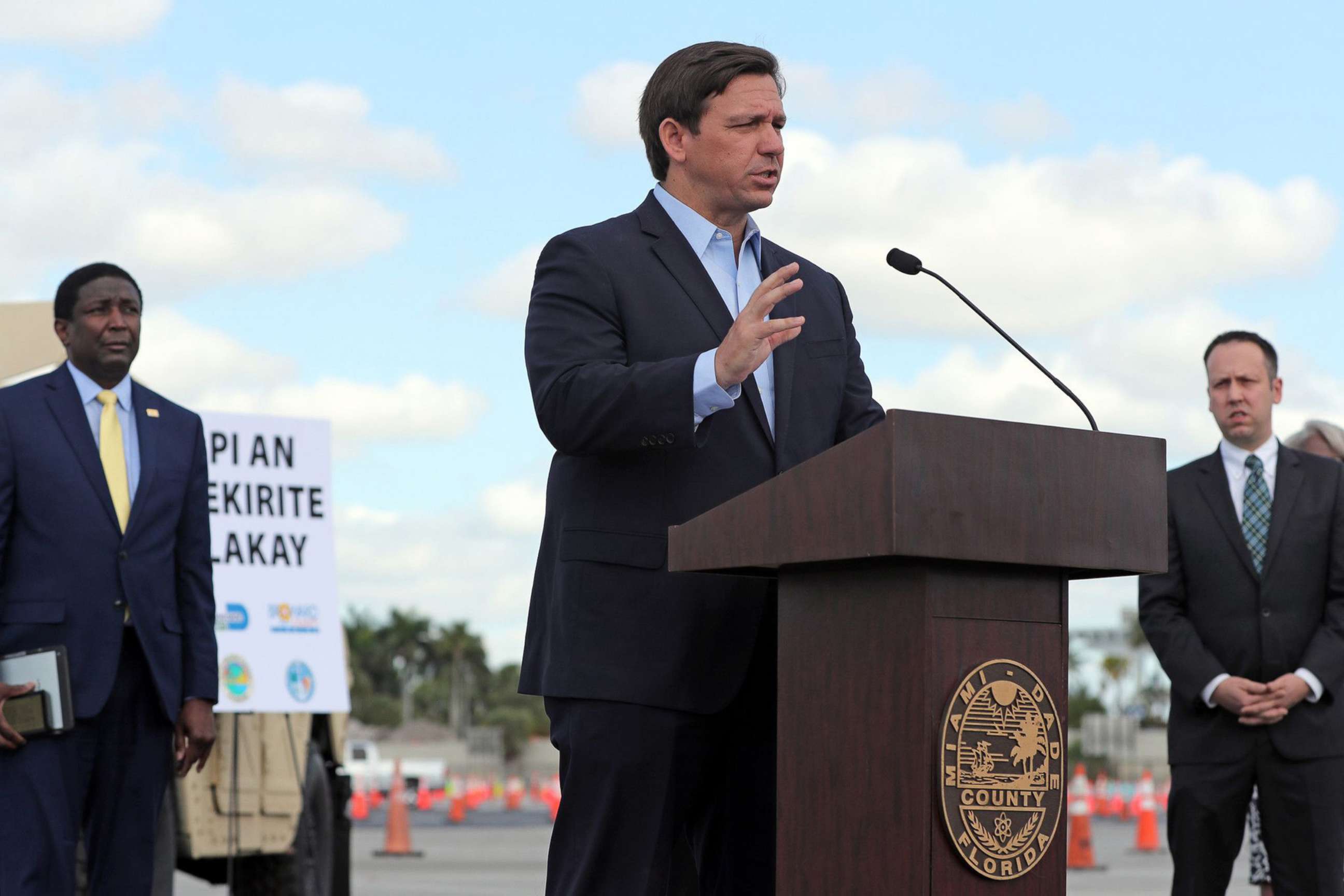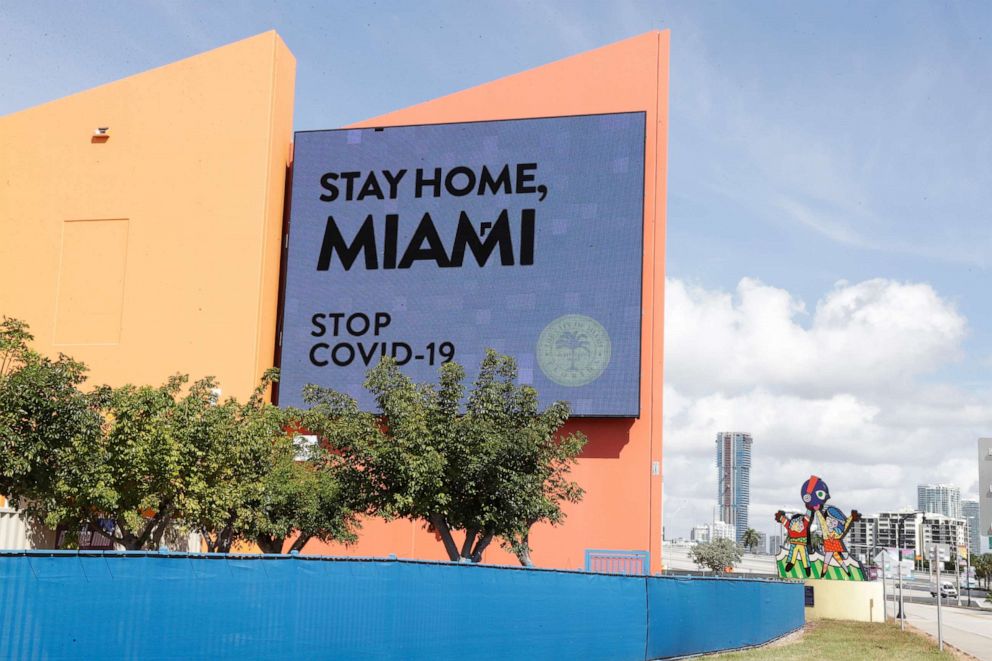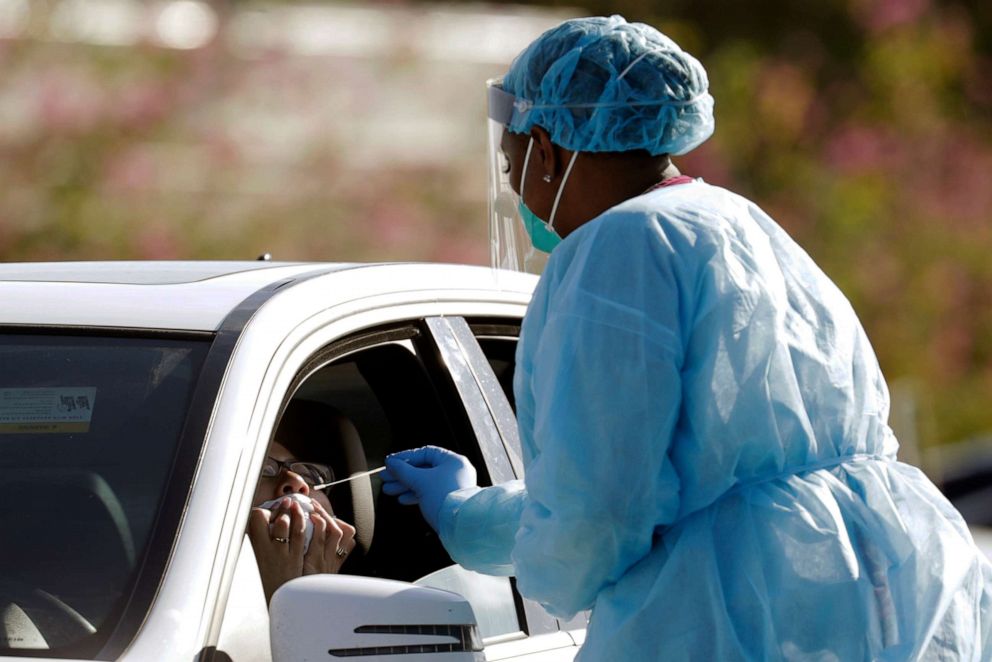After talk with Trump, Florida reverses course on coronavirus stay-at-home order
Confirmed cases of coronavirus have continued to rise in Florida.
President Donald Trump had direct praise for Florida Gov. Ron DeSantis at a press conference Tuesday: "Great governor. Knows exactly what he’s doing." Trump hailed Florida's response to the novel coronavirus outbreak as he answered a question about the Republican's resistance to issuing statewide stay-at-home restrictions for Floridians.
Now, less than 24 hours after the administration revealed sobering data with death toll projections in the U.S. between 100,000 to 240,000 with social distancing and proper mitigation measures in place, DeSantis reversed course and told citizens in his state Wednesday afternoon to stay home for the next 30 days.
As elsewhere in the country, confirmed cases of coronavirus have continued to rise in Florida, up to nearly 7,000 as of Wednesday, the fifth-highest total of any state, according to data compiled by Johns Hopkins University.
DeSantis has developed a close relationship with the president and the two speak frequently. On Monday Trump opened a call with governors by congratulating DeSantis and his wife, Casey, on their new baby, joking that he had a good excuse not to be on the phone call, according to an audio recording of the call obtained by ABC News.
DeSantis said he spoke with the president and other White House officials about Wednesday’s decision to order Floridians to stay at home, prior to the announcement.
"I did consult with folks in the White House. I did speak with the president about it," DeSantis said Wednesday. "He agreed with the approach of focusing on the hot spots but at the same time, you know, he understood that this is another 30-day situation and you gotta just do what makes the most sense."

From the beginning of the coronavirus spread in the U.S., DeSantis faced scrutiny over what some critics have described as a lackadaisical approach to restricting gatherings and ordering the closing of various businesses as some other states were quicker to do so.
Florida Democrat Rep. Debbie Wasserman Schultz said last week that DeSantis's decisions had shown a lack of leadership in the state.
"We have a governor who has been really irresponsible and has had an absence of leadership," she said. "I'm trying to think of the nicest way I can put it."
Last month, when photographs of crowded beaches filled with spring breakers emerged, the governor left the decision to close beaches to local municipalities. DeSantis did end up ordering beach gatherings be limited to 10 people, but he stopped short of ordering them closed.
Democratic members of Florida’s congressional delegation also raised their concerns in a letter to DeSantis Tuesday, telling him they appreciated a recent announcement issuing a "safer at home" order for the southern portion of the state, but said that wasn’t enough given the rapid increase in positive cases.
"This pandemic has not respected global borders so it certainly will not respect county borders," the 13 Democratic members wrote. "We cannot wait, and we cannot leave this decision to county and municipal governments. We urge you to immediately issue a statewide stay-at-home order to save lives."
A total of 45 states have now issued or announced statewide closures of nonessential businesses. Georgia Gov. Brian Kemp and Mississippi Gov. Tate Reeves also issued a stay-at-home orders for their states Wednesday.
Prior to the reversal, when specifically asked about DeSantis not issuing a stay-at-home order, the U.S. Surgeon General Jerome Adams said on NBC that his "advice to America would be that these guidelines are a national stay at home order" as he held up the White House recommendations to slow the spread of the virus.
While Florida has lagged behind other states in their response, the state has received all of their requested supplies from the federal government within days of the request.

Florida is also among only few states that are the first to receive newly developed rapid tests that are expected to significantly reduce test turnaround time. DeSantis said during a press briefing that the state has deployed about 1,700 rapid tests to Memorial Healthcare System and another 500 to northern Florida.
When the president was asked why Florida has received 100 percent of its request for supplies compared to other states that are having difficulty and have pleaded for help, he said it’s because Florida is "very aggressive."
"Well, Florida, they are very aggressive in trying to get things, and they are doing a very good job, but I think I can say all of the governors are very committed," Trump said Sunday. "We’re very committed. We’re working together. We’re getting things out at a level that nobody has ever seen before."
Memorial Healthcare System said it has "ample protective equipment" for its front-line workforce thanks to its significant inventory prior to the outbreak and to community donations.
On Monday, Florida's Department of Emergency Management said officials there have ordered 250,000 coveralls, 500,000 gowns, 500,000 gloves, 150,000 full kits of protection and 2 million of the all-important N95 masks.
But some Florida nurses and their unions say healthcare workers in the state are still pushed into dangerous front-lines without the proper protection.
Rosanne O'Malley, an emergency room nurse at the Medical Center of Trinity in the city of Trinity told ABC News that her hospital provides its staff with just one procedural mask throughout their shift, and N95 masks. Other protective gear like gowns, gloves and goggles are reserved only for those entering COVID-19 units, she said.

O’Malley, who is part of the team that screens incoming patients for fever and coughs before they enter the emergency room, said her team should have more protection than just disposable surgical masks that they wear throughout their 12-hour shift, and her hospital should have the money and resources to provide that.
"Gov. DeSantis says he's gotten the equipment but the trickle down just hasn't happened yet," O’Malley said. "Maybe just we don't see that in the emergency room but a lot of nurses on the floor are saying the same thing. We have minimal protection, but not maximum protection."
Kim Brooks, a registered nurse with a stepped-down intensive care unit at Blake Medical Center in Bradenton said she was suspended from work for wearing an N95 mask she brought herself. Brooks said she wasn’t taking care of COVID-19 patients but she felt that she needed to protect herself and her family now knowing who might have the virus.
"It is very scary. We do feel like there is a shortage. Just on the regular floor, or even on the stepped-down ICU floor without COVID patients, we don't have the opportunity to have the masks unless we supply them ourselves," Brooks said. "We're open to contracting the virus. I'm concerned for their physical health care workers across the country."
The Medical Center of Trinity and Blake Medical Center did not immediately response to ABC News' request for comment.
Dr. Mark Supino, an attending physician in the Emergency Department at Jackson Memorial Hospital in Miami, said that while he feels the hospital has "adequate" personal protection equipment supplies, they have been rationing so that they do not run out. Supino told ABC News he has been wearing the same N95 mask for a week.
Supino has also begun wearing a regular surgical mask that can be more easily discarded over his N95 respirator, which he described as a "smart" way to protect a vital supply.
"This is kind of what we have always been preparing for," Supino said. "But I don't think any of us could have ever predicted something on this scale."




